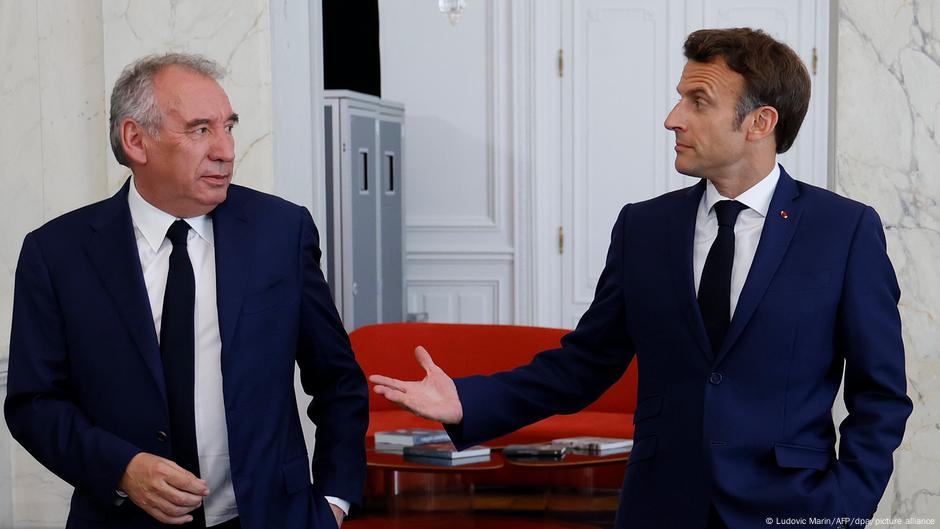Skip next section Where does France’s confidence vote leave President Macron?
09/08/2025September 8, 2025Where does France’s confidence vote leave President Macron?
Under the French political system, the president is the head of state and commander-in-chief of the armed forces with substantial powers over European affairs and foreign policy, but domestic economic policy is largely the preserve of the prime minister, who is appointed by the president.
As such, while President Emmanuel Macron remains an influential figure on the global stage, for instance as a key representative of the European Union in its dealings with Russia, Ukraine and the United States, he risks becoming a lame duck domestically.
According to a poll for the major daily newspaper Ouest-France, Macron’s approval ratings are currently at around minus 77%. In another poll commissioned by the conservative broadsheet Le Figaro, 64% of French voters would prefer Macron to resign as president rather than name a sixth new prime minister.
Macron’s second and final presidential term ends in 2027, until which point the 47-year-old has vowed to remain in office.
Addressing the domestic crisis after an international summit on Ukraine last Thursday, Macron called on France’s political forces to demonstrate “responsibility” and ensure “stability.”
“The reshaping of the world is changing many things for our Europe,” he said. “In this context, France must continue to move forward.”
https://p.dw.com/p/509ll
Skip next section Why is the French government so fragile?
09/08/2025September 8, 2025Why is the French government so fragile?
The current instability in the French parliament dates back to President Emmanuel Macron‘s shock decision in June 2024 to call snap legislative elections which almost saw the far-right National Rally (Rassemblement National) emerge as the largest party in the National Assembly, only for a spontaneous coalition of left-wing parties to defeat them in a spectacular second round which saw a 66.63% turnout – the highest since 1997.
But while the left-wing coalition, known as the New Popular Front (Nouveau Front Populaire) may have been united in opposition to Marine Le Pen, Jordan Bardella and the far-right, they agreed on little else.
President Macron’s first prime ministerial appointment, Gabriel Attal, lasted just eight months before being succeeded by former Brexit negotiator Michel Barnier, who became the shortest-serving prime minister in modern French history when he was toppled by a no-confidence vote in December 2024.
Since then, Bayrou has struggled with the same impossible parliamentary mathematics in a frustrated National Assembly in which the far-right feel they were effectively robbed of electoral victory by the spontaneous left-wing alliance, which in turn feels the center-right governments and prime ministers appointed by President Macon don’t reflect their parliamentary majority.
Consequently, both the far-right and the far-left now appear determined to bring down the government.
“What’s the point of bringing down the government?” asked a frustrated Bayrou in an interview with online media outlet Brut on Sunday.
“These are political groups that not only don’t agree on anything but, far worse than that, are waging open civil war against each other.”
https://p.dw.com/p/509fs
Skip next section Why is the French Prime Minister tabling a vote of confidence?
09/08/2025September 8, 2025Why is the French Prime Minister tabling a vote of confidence?
French Prime Minister Francois Bayrou, a veteran centrist who has only been in office for nine months, has been struggling to push through what he considers to be urgently needed reforms as the country faces an increasingly dire fiscal crisis.
Bayrou has proposed public spending cuts totaling €44 billion ($51 billion) in 2026 in order to combat government debt which in the first quarter of 2025 stood at €3.346 trillion, or around 114% of GDP.
Meanwhile, France’s deficit hit 5.8% of GDP last year, way above the official European Union target of 3%.
Bayrou’s plan to remove two public holidays has gone down particularly badly, presenting his many parliamentary rivals with a chance to bring down the fragile coalition government.
https://p.dw.com/p/509b0
Skip next section Welcome to our coverage09/08/2025September 8, 2025Welcome to our coverage
Bonjour and welcome to DW’s coverage of developments in France on Monday, September 8.
Prime Minister Francois Bayrou is set to table a vote of confidence in his fragile government, which he is expected to lose.
The vote comes amid opposition to Bayrou’s planned austerity measures to combat France’s spiraling debts and fiscal deficit.
The collapse of Bayrou’s government would leave President Emmanuel Macron searching for a fourth prime minister in barely a year and ramp up domestic pressure.
https://p.dw.com/p/509W6
